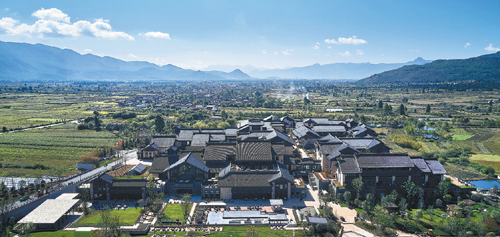Club Med enjoys a post-pandemic resurgence in China and across the world

French resort operator Club Med, a brand under the Chinese conglomerate Fosun Tourism Group, saw a strong business rebound in China and overseas as travel restrictions related to the COVID-19 pandemic were further eased worldwide.
In 2022, Club Med saw its business volume exceed 12 billion yuan ($1.74 billion), up more than 100 percent compared to that of 2021. The volume of 2022 reached 99 percent of the volume of 2019. Its resort capacity in 2022 increased by 62 percent compared with 2021 and reached 92 percent of the 2019 level, according to the Fosun Tourism Group annual results 2022 released in March. For January and February 2023, business volume has reached the highest monthly level in recent years.
The success is also partly attributed to the company's efforts in upgrading the resorts' scale. In 2022, Club Med opened new resorts worldwide, including the Changbaishan resort in Northeast China's Jilin province, the Thousand Island resort in East China's Zhejiang province, the Marbella resort in Spain, and New Tignes and Val d'Isere resorts in France.
Henri Giscard d'Estaing, president of Club Med, said: "The year 2022 was an important milestone in our strategy to move upscale. Club Med has never had, in its 73-year history, such a beautiful resort portfolio."
"With the opening of new resorts, the capacity of high-end resorts has accounted for 95 percent of the total," Giscard d'Estaing said.
Moreover, Club Med has planned to open 17 new resorts from early 2023 to the end of 2025.
"The outlook for the first half of 2023 is encouraging with the strong momentum in travel consumption in Asia, and we have all the necessary assets to sustain future growth," Giscard d'Estaing said. "However, our acceleration remains subject to sensitive geopolitical and economic contexts."
Club Med now boasts nearly 70 resorts in about 40 countries and regions, 85 percent of which are PAI (Premium All-Inclusive) and Exclusive Collection resorts. It has over 23,000 GOs (Gentil Organisateur) and GEs (Gentil Employees) from 110 countries and regions.
Club Med entered China in 2003. To ensure better and long-term development in the Chinese market, it launched its Chinese brand name, "Di Zhong Hai Ju Le Bu", which literally means Mediterranean Club, in August 2022. The name marks the beginning of Club Med's new journey in China and shows its willingness to capture all the opportunities to grow here. It also demonstrates Club Med's determination to serve Chinese consumers and the market better. The new Chinese name is now used in all Club Med marketing communication and resorts in China.
On March 21, Club Med announced at a trade conference that it would open an office in Chengdu, the capital of Southwest China's Sichuan province. It will be its fourth office in China, in addition to the ones in Shanghai, Beijing and Guangzhou. Chengdu has an important strategic position in the cultural tourism industry in China's central and western regions. Club Med sees the city as an opportunity to provide more Chinese guests with localized and diversified holiday products and French vacation experiences.
"Taking the opportunity, we will comprehensively, continuously and vigorously develop the market in West China and realize the joint development of Club Med resorts in North China, East China, Guangdong-Hong Kong-Macao Greater Bay Area, and West China," Club Med said.
In China's western region, Club Med has opened a resort in Lijiang of Yunnan province and is now building another resort in Heilongtan in Chengdu.
"We are delighted to have a beautiful resort in Lijiang, one of the iconic Chinese tourist destinations. It has become very successful, while it is very different and has minority ethnic characteristics," Giscard d'Estaing said.
During the weeklong Chinese New Year holiday of 2023, Club Med Lijiang had a 96 percent occupancy rate, which met the demand of local and surrounding consumers for middle and high-end vacations. Furthermore, it attracted international tourists to Lijiang.
Thanks to the Beijing Winter Olympics' positive influence, snow and ice sports tourism has grown significantly in China. Club Med has benefited from its global ice and snow industry layout and introduced its best international practices and experiences into China's winter tourism industry. In China, Club Med currently operates three ski resorts in Changbai Mountain and Beidahu in Jilin province, as well as Yabuli in Heilongjiang province.
Upon China's lifting of restrictions on outbound tourism, Club Med sees rapid growth in bookings from Chinese travelers. It is well positioned to continue to attract Chinese tourists seeking an unforgettable vacation experience. "Our marketing teams in Club Med China have worked and got prepared for months to recreate the desire and the dream to travel globally again," Giscard d'Estaing said.
"We have decided to send 200 Chinese GOs outside China this summer to welcome the Chinese families and guests. It's good for our GOs, because our young people want to travel and grow, and they will have an experience abroad. When they return, they will be stronger and better, with better languages, and accept international clients who come to China," he added.
China is becoming an important source market for Club Med worldwide and a landing point for its international resort layout. "The Chinese market is full of dynamism and prospects for continuous growth. This year, we will have three new resorts in China, which will be located in Taicang city and Nanjing's Xianlin area in Jiangsu province as well as Heilongtan town, Sichuan province," Giscard d'Estaing said.



Today's Top News
- Huangyan approved as nature reserve
- Establishment of Huangyan Island nature reserve safeguards its marine environment
- Defense minister: Containment efforts unworkable
- Huangyan Island National Nature Reserve gets official go-ahead
- Defense leaders from over 100 countries to attend Xiangshan Forum
- China honors model teachers in celebration of Teachers' Day






























